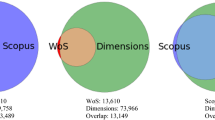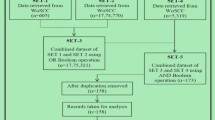Abstract
Although between one-third to one-half of world social sciences research literature is published in languages other than English, studies show very scant use of it by American and English scholars. Almost all studies, however, were conducted from the Anglo-Saxon perspective, limiting the scope of the study to English-published sources or English-speaking scientists and research workers. The present study aimed at assessing the scope of the language preference in a social sciences field, not only among American and British scholars, but among German and French ones as well, using the technique of citation analysis. Samples including mostly 50–60 original research articles were drawn from the 1985–1994 volumes of nine leading sociology journals published in the US, UK, Germany and France and the references appended to each were scrutinized in order to determine the frequency distribution of the languages cited in each periodical. Findings clearly showed a strong preference of writers to cite material in their own language. However, the extent of this bias differed from journal to journal. The American and British writers rank first, with close to 99% of their references being in English. German scholars rank next, preferring German sources in 75% of the cases, and French scholars quote French sources in only 66% of their references.
In order to calculate the new refined measure of ‘relative own-language preference’ (ROLP) indicator, the proportions of ‘language self-citation’ were related to the estimated proportions of these languages in the existing body of sociology research. This measure reveals that German sociologists have the strongest bias towards their mother-tongue, their ratio of references in German exceeding almost 12 to 28 times the expected figure according to the German language share in sociology research. Next come French sociologists (8 to 14 times) while American and British ones display the lowest own-language bias, only slightly higher than expected. Further analysis of the foreign languages preference of each group, according to a ‘mutual-use’ matrix, shows a relative low use of German and French sources by British-American sociologists.
Similar content being viewed by others
References
Bradely, D. (1993), European elites envy American cohesion,Science, 260, 1738–1739.
Chan, G. K. L. (1976), The foreign language barrier in science and technology,International Library Review, 8, 317–325.
Earle, P., Vickery, B. (1969), Social science research literature use in the UK as indicated by citations,Journal of Documentation, 25, 123–141.
Ellen, S. R. (1979), Survey of foreign language problems facing the research worker,Interlending Review, 7(2), 31–41.
Engelbert, H. (1976), The terminological barrier to the understanding of scientific and technological literature,Translation News, 6(2), 2–10.
Finison, L. J., Whittemore, C. L. (1975), Linguistic isolation of American social psychology,American Psychologist, 30, 513–516.
Fitzgibbons, S. A. (1980), Citation analysis in the social sciences. In:Stuart, R. D., Miller, G. B. (Eds),A Collection Development in Libraries; a Treatise, Greenwich, Conn. JAI. Part B, 291–344.
Garfield, E. (1980). Do French scientists who publish outside of France and/or in English do better research? In:Garfield, E.:Essays of an Information Scientist. vol. 3. Philadelphia, ISI Press, 498–503.
Guttsman, W. L. (1966). The literature of the social sciences and provision for research in them,Journal of Documentation, 22, 186–194.
Hanson, C. W. (1962),The Foreign Language Barrier in Science and Technology, London, Aslib.
Holmstrom, J. E. (1973), The foreign language barrier, In:Sherrod, J., Hodina, A. (Eds),Reader in Science Information, Washington, D.C., Microcard, 94–103.
Hutchins, W. J. et al. (1971),The language Barrier, University of Sheffield.
Inman, C. R. H. (1983). Scientific Publications in English and developing countries: a report of a survey of scientists' experiences,Journal of Information Science, 6, 159–164.
Jagodzinski-Sigogneau, M. et al. (1982) How to measure the degree of independence of a research system?Scientometrics, 4, 119–133.
Large, J. A. (1983),The Foreign-Language Barrier; Problems in Scientific Communication, London, Andre Deutsch.
Leck, C. F. (1978), Foreign languages and biologists, today,Bioscience, 28, 367.
Louttit, C. M. (1955). The use of foreign languages by psychologists,American Journal of Psychology, 68, 484–486.
Michel, J. (1982), Linguistic and political barriers in the international transfer of information in science and technology,Journal of Information Science, 5, 131–135.
Morgan, B. A. (1977), National bias in reference citation in English language agricultural engineering journals,IAALD Quarterly Bulletin, 22(3–4) 60–64.
Nicholas, D., Ritchie, M. (1978),Literature and Bibliometrics, London, Clive Bingley.
Ralph, A. (1982), Language and information retrieval in the social sicences,Aslib Proceedings, 34, 394–405.
Regaunt, S. (1993), What lingua franca?Nature, 361, 107.
Regaunt, S. (1994), English as lingua franca in geological scientific research; a bibliometric study.Scientometrics, 29, 335–351.
Schmidt, J. M. (1979), Translation of periodical literature in plant pathology,Special Libraries, 70, 12–17.
Sherwood, B. A. (1979), Universal language requirement,Physics Today, 32, 9.
Stewart, J. (1970), The literature of politics: a citation analysis,International Library Review, 2, 329–353.
Thorp, R. G. et al. (1989), The foreign language barrier: a study among pharmaceutical research workers,Journal of Information Science, 14, 17–24.
Wellisch, H. (1973), Linguistic and semantic problems in the use of English-language information services in non-English-speaking countriesInternational Library Review, 5, 147–162.
Wood, D. N. (1967), The foreign-language problem facing scientists and technologists in the U.K.-report of a recent survey,Journal of Documentation, 23(2), 117–130.
Wood D. N., Bower, C. A. (1969), The use of social science periodical literature,Journal of Documentation, 25, 108–122.
Yitzhaki, M. (1988), The language barrier in the humanities: the case of biblical studies,INFORMETRICS 87/88;Select Proc. of the First International Conf. on Bibliometrics, Diepenbeek, Belgium, Aug. 1987, Amsterdam, Elsevier, 301–314.
Yitzhaki, M. (1989), Subject dispersion and discipline affiliation,Scripta Hierosolymitana (Publications of the Hebrew University of Jerusalem) 29, 217–249.
Author information
Authors and Affiliations
Rights and permissions
About this article
Cite this article
Yitzhaki, M. The ‘language preference’ in sociology: Measures of ‘language self-citation’, ‘relative own-language preference indicator’, and ‘mutual use of languages’. Scientometrics 41, 243–254 (1998). https://doi.org/10.1007/BF02457981
Received:
Issue Date:
DOI: https://doi.org/10.1007/BF02457981




